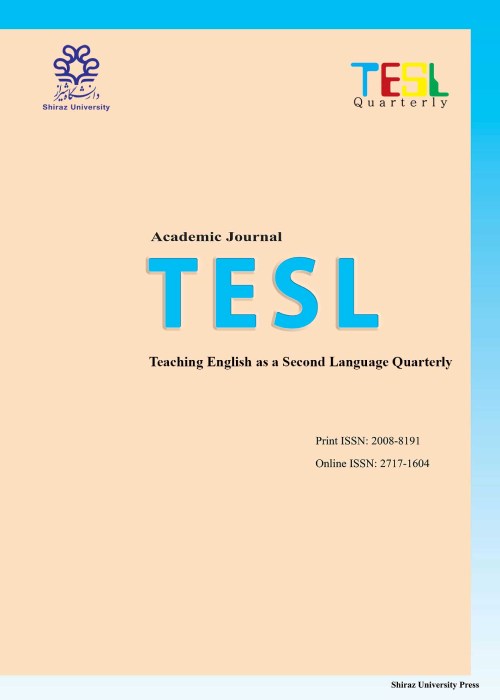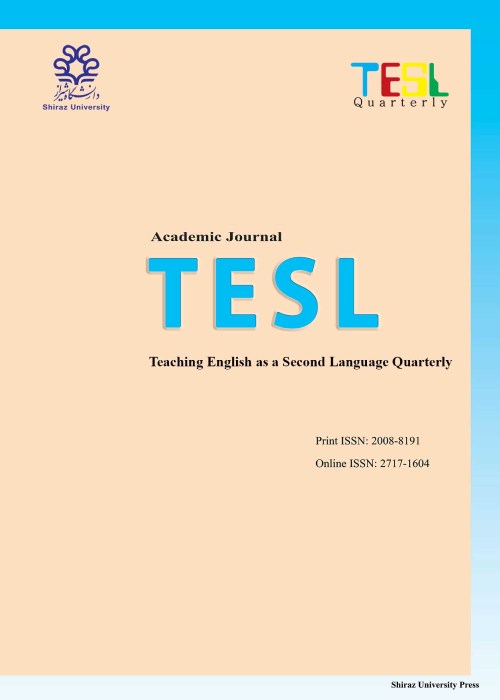فهرست مطالب

Teaching English as a Second Language Quarterly
Volume:42 Issue: 3, Summer 2023
- تاریخ انتشار: 1402/06/10
- تعداد عناوین: 6
-
-
Pages 1-27Research on native vs. non-native formulaic language use in academic texts, despite its wealth in scope and frequency, lacks an inclusive conceptualization of a non-native language learning context. Impressed by such a flawed approach, the bulk (if not all) of studies in the field compared the use of different multi-word strings in the academic discourse of either foreign or second language learners with a native baseline. The current study sought to address the gap, focusing on the structural and functional use of lexical bundles in two culturally parallel corpora developed in two non-native learning context modes: English as a foreign (EFL) and second (ESL) language. To this end, research reports written by Iranian Applied Linguistics MA and Ph.D. learners studying in different universities in Iran and English-speaking provinces of Canada were compared by a structurally similar native corpus, running cross-tabulation, Chi-square, and residual analysis analyses. The results revealed a significant association between language learning context and lexical bundle use on a functional level. The contextual variations yielded significantly different patterns of use concerning several micro-functions underlying text-oriented and research-oriented functions. Compared to functional differences, the between-corpus structural differences were inconspicuous, specifically concerning micro-structures constituting noun, prepositional, and verb phrase-related bundles. The study embraced the notion that EFL writers need to have immense exposure and enhanced language input available in ESL and native learning contexts to foster a native-like formulaic language.Keywords: academic writing, formulaic language, language learning context, lexical bundles, lexical development
-
Pages 29-57The global outbreak of COVID-19 necessitated a swift transition from conventional face-to-face (F2F) teaching to Emergency Remote Teaching (ERT) in educational institutions worldwide. This sudden shift posed significant challenges for both teachers and students, particularly those in low-resource rural schools. This study sought to probe into this experience in the context of English as a Foreign Language (EFL) instruction, focusing on the perspectives of teachers and students in rural high schools within Iran. The study participants were 13 female EFL teachers and 15 female EFL students teaching and studying in rural high schools in different cities in Iran. Employing a qualitative approach, data were gathered through semi-structured interviews, online observation, and one of the researcher’s reflective journals. Thematic analysis was utilized to analyze the data, identifying several categories encompassing the hurdles encountered by the participants and the achievements they attained. The identified categories pertaining to hurdles encompassed technological, financial, educational, personal, professional, and well-being problems. Similarly, the categories pertaining to achievements comprised technological, educational, and professional progress, as well as enhanced convenience. Exploring the dilemmas and aspirations expressed by these participants can inform and better equip the educational system of Iran to effectively respond to similar crises in the future. Furthermore, this study offers insights to education authorities, aiding in the resolution of barriers to distance online education and facilitating enhanced preparedness for potential future emergencies.Keywords: ERT Adoption, Hurdles, Achievements, English as a Foreign Language (EFL), rural high schools, COVID-19
-
Pages 59-78Recruiting efficient EFL teacher educators (TEs) is crucial for language institutes as it can directly affect the quality of language instruction and, consequently the success of language institutes. Nevertheless, language institute policies for employing TEs and strategies for their professional development have not been well-documented. To this end, semi-structured interviews were conducted in this qualitative study to investigate 30 language institute managers’ recruitment policies and professional development strategies for employing non-native English TEs in the Iranian EFL context. The participants’ answers to interview questions were transcribed and analyzed based on the three levels of the open, axial, and selective coding process. The results revealed that job experience, academic/educational competencies, and digital literacy are the most important features implicating the recruitment of TEs. As for professional development strategies for TEs, the main ones included holding regular meetings for TEs, asking TEs to take part in professionally relevant seminars, workshops, and webinars, and encouraging them to make peer observations of teacher education courses. These findings have implications for language TEs' recruitment and their professional development.Keywords: Language institute managers, Non-native English teacher educators, Professional development, Strategies, Teacher educator recruitment
-
Pages 79-115Adaptive teaching addresses students’ diversity and their immediate learning needs. Particularly, in the high-interactive context of English teaching, fostering adaptive teaching in teacher professional development programs not only stimulates teacher change at the micro level, but also facilitates implementing the organizational and curricular innovations imposed by authorities at the macro level. The current English teaching literature lacks a measure for evaluating and fostering adaptive teaching within higher education. Hence, within the present study, the Interconnected Model of Teacher Professional Growth (IMTPG) was adapted and validated as a measure for evaluating and fostering teacher adaptability for 183 international English teachers in higher education. Structural Equation Modelling (SEM) was employed for validating two different enactment and reflection links in the original IMTPG, and the final adapted IMTPG for adaptive teaching (At-IMTPG) was proposed. The AT-IMTPG can be applied for evaluating how adaptive English teachers are, seeking to resolve the problem of implementing educational innovations by English teachers in higher education. It can also be used to design teacher professional growth programs for fostering adaptive teaching within English teaching higher education. Such a change in the classroom level is hoped to be translated into an educational change in English teaching higher education.Keywords: Teacher professional development, Teacher change, Adaptive teaching, Structural Equation Modeling, confirmatory factor analysis
-
Pages 117-146This study investigated the interplay of working memory capacity and language proficiency in the context of vocabulary acquisition through word-focused tasks. The involvement load hypothesis serves as a theoretical framework, positing that the degree of cognitive engagement influences lexical learning outcomes. A total of 100 EFL learners participated in this study. They were divided into distinct groups based on varying levels of working memory capacity, language proficiency, and aspects of working memory (phonological short-term memory and executive working memory). The participants engaged in receptive and productive vocabulary tasks under different experimental conditions, including reading-only, reading plus blank-fill, and reading plus production. The results revealed intricate relationships between working memory capacity, language proficiency, and vocabulary acquisition. While the efficacy of the hypothesis varied across conditions, its predictions were influenced by the nuances of individual cognitive capabilities and language competence. Additionally, the role of input modality in shaping vocabulary learning outcomes was highlighted. The study contributes to the theoretical understanding of vocabulary acquisition by underscoring the complex interplay of cognitive processes and language factors. These insights hold implications for foreign language pedagogy, guiding educators in crafting more effective interventions for enhancing both receptive and productive lexical knowledge.Keywords: language proficiency, involvement load hypothesis, receptive, productive lexical gain, working memory
-
Pages 147-166Drawing on qualitative research, this study explores, from a complex dynamic systems theory perspective, the motivation of Burundi junior high school students simultaneously learning L2 French and L3s English and Kiswahili. It aims to fill the gap in research on (1) changes in motivational dynamics and factors responsible for any fluctuations in the levels of motivation over time and (2) complex interactions between different learner variables among multiple language learners. Twelve school pupils who were all Kirundi native speakers participated in this study. Retrospective interviews were used to collect data relating to the students’ multilingual learning experiences over the period of their formal education. The findings indicated that the intensity in learning each target language fluctuated over time with English generally enjoying the highest increase and Kiswahili the lowest and that different factors were responsible for such dynamic changes. Besides, complex interactions between the students’ L1, L2, and L3s linguistic knowledge and their foreign language learning motivations were revealed. These results indeed highlight the complex and dynamic nature of motivation in learning multiple languages. In the light of these findings, practical implications are discussed based on the Burundi educational context.Keywords: motivation, Complex Dynamic Systems Theory, Changes in motivation, Motivational factors, Multilingualism


